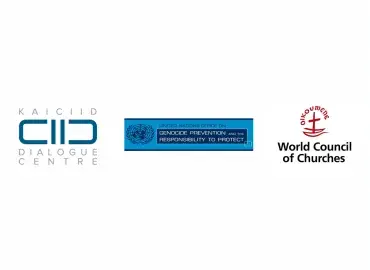KAICIID-Organised Forum Discusses Role of Religious Leaders in Preventing Atrocity Crimes

The role of religious leaders and faith-based organizations in the prevention of atrocity crimes was the focus of discussion on Thursday, April 23, 2015 in Fez, Morocco, during an international conference organized by the United Nations Office on Genocide Prevention and the Responsibility to Protect, the King Abdullah Bin Abdulaziz International Centre for Interreligious and Intercultural Dialogue (KAICIID), the Interministerial Delegation for Human Rights (DIDH) and Rabita Mohammadia of Ulama of Morocco.
At the opening session, Mr Adama Dieng, UN Special Adviser on the Prevention of Genocide welcomed the choice of the city of Fez, for its mythical and symbolic status, to host this conference.
"What we want to achieve in Fez is to bring religious leaders to focus on an important issue, namely the prevention of incitement that can lead to atrocity crimes" Mr Dieng said. He emphasized the important role that religious leaders can play in preventing or countering incitement to violence, promoting tolerance and calling for an end to discrimination, noting that religious leaders can also sometimes themselves be responsible for hate speech and incitement to violence. To religious leaders gathered at the conference he said: "You are present here because you have demonstrated that there are ways to take action. You are here to show that it is possible to respond to incitement.”
The main objective of this Forum according to Mr Dieng is to "lay the foundations, solid foundations, for an Action Plan that will allow religious leaders to act against incitement to hatred and mass violence". He concluded his speech with the announcement that the Fez conference will be followed by five regional meetings where the Action Plan developed in Fez will be strengthened and augmented with specific and detailed elements from different regions.
Mr Faisal Bin Muaammar, Secretary General of KAICIID said "This conference is timely. In the previous century, and in this one, despite the best efforts of the international community, we have been faced, again and again, with atrocities, incitement and the loss of life of many hundreds and thousands of people.
Mr Bin Muammar said that "We live in a pluralistic world, and with each passing day, we come closer together. People are separated by different identities, religious, cultural, or national: when those identities become a source of fear and mistrust we can expect violence to follow. There are many in this world who misuse religion to promote violence for their own narrow ends.”
He called on participants to unite in condemning violence in the name of religion. He also stressed "the importance of the concept of common citizenship: a notion of citizenship based on diversity rather than majority." He also urged everyone to "adopt dialogue as a way of life, without which violence and incitement can never be totally defeated."
Mr. Bin Muaammar went on to explain that building peace and promoting common dialogue is the focus of KAICIID’s work. The Centre was established to foster dialogue between the followers of diverse religions and cultures, and to engage religious leaders through dialogue.
Mr Ahmed El-Abbadi, Secretary General of Rabita Mohammadia Ulama in Morocco said: "Today, we are witnessing a proliferation of violence and hate speech in the guise of religion which must instead be the essence of beauty and love rather than producing chaos."
Mr Abbadi pointed to the main challenges religious communities face while fighting incitement to hatred and discrimination, including shaping strategies to counter incitement to hatred, training people and religious leaders to execute these strategies and establishing networks aimed at improving education.
"If terrorism is regarded as the principal enemy of human rights, protection of human rights in the current global environment requires the adoption of practical measures for education and awareness of non-violence and the cessation of hate speech, Mr Mahjoub El Haiba, Interministerial Delegate for Human Rights said. He added that it is necessary "to fight against the causes which feed incitement to hate speech and violence and punish the perpetrators of these crimes, and also to develop the rule of law and to promote the development and strengthening of democracy.”

During a UN Security Council open debate on 23 April 2015 on “The role of youth in countering violent extremism…
08 December 2016, Bangkok – Religious leaders from across the Asia-Pacific region met in Bangkok on 6 and 7…
Fez, Morocco, 24 April 2015- Participants at the Forum with religious leaders organized by the…


![Fes Plan of Action [file:field-file-image-alt-text]](/sites/default/files/styles/cards_360_270_scale_crop/public/img_4414_copy_2_1.jpg.webp?h=81d80e70&itok=yU5TYiXY)